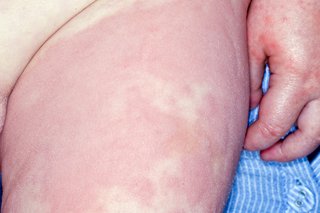Hives rashes usually settle down within a few minutes to a few days. You can often treat hives yourself.
Check if you have hives

DR P. MARAZZI/SCIENCE PHOTO LIBRARY

Elizabeth Nunn / Alamy Stock Photo
Hives can be different sizes and shapes, and appear anywhere on the body in both adults and children.
The rash is often itchy and sometimes feels like it's stinging or burning.
If you're not sure it's hives
Look at other rashes in babies and children.
A pharmacist can help with hives
Your pharmacist can give you advice about antihistamine tablets to bring down your hives rash.
Tell your pharmacist if you have a long-term condition – you might not be able to take antihistamines.
They also may not be suitable for young children.
Non-urgent advice: See a GP if:
- the symptoms do not improve after 2 days
- you're worried about your child's hives
- the rash is spreading
- your hives keep coming back – you may be allergic to something
- you also have a high temperature and feel generally unwell
- you also have swelling under the skin – this might be angioedema
Immediate action required: Go to A&E or call 999 if you have:
- difficulty breathing
- difficulty swallowing
- dizziness or fainting
- nausea or vomiting
- an increased heart rate
- rapid and severe swelling of the face, mouth or throat
These could be signs of a severe allergic reaction, such as anaphylactic shock.
Treatment for hives from a GP
Your GP may prescribe corticosteroids, menthol cream or stronger antihistamines.
If your hives do not go away with treatment, you may be referred to a skin specialist (dermatologist).
You cannot always prevent hives
Hives occur when something causes high levels of histamine and other chemicals to be released in the skin. This is known as a trigger.
Triggers can include:
- food
- pollen and plants
- insect bites and stings
- chemicals
- latex
- dust mites
- heat – work and sleep in a cool room and wear loose, lightweight clothes
- sunlight, exercise or water
- medicines – speak to a GP if you have an allergic reaction
- infections
- emotional stress
Page last reviewed: 6 February 2018
Next review due: 6 February 2021
